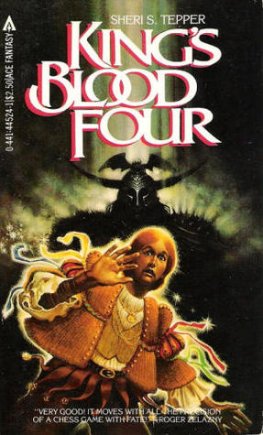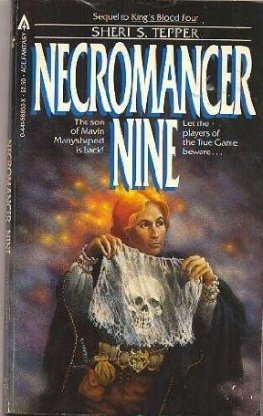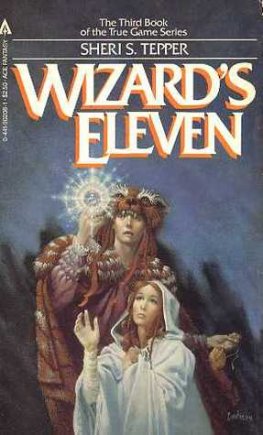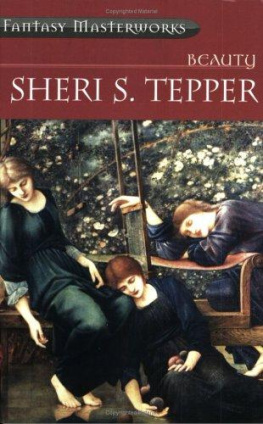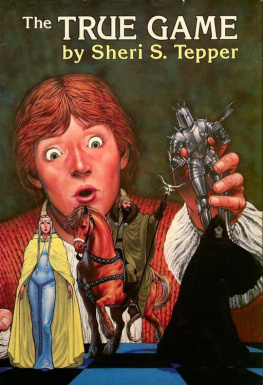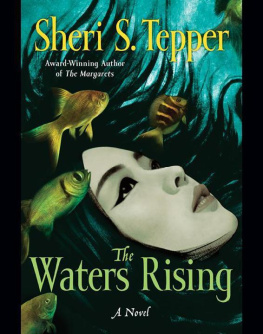SHERI S.
TEPPER
S IX M OON D ANCE

Contents
I ts all right, Mouches mother said. Next time well have a girl.
Mouche knew of this because his father told him. She said it was all right. She said next time
But there had been no next time. Why the inscrutable Hagions decided such things was unknown. Some persons profited in life, producing daughter after daughter; some lost in life, producing son after son; some hung in the balance as Eline and Darbos did, having one son at the Temple, and then a daughter born dead at the Temple, and then no other child.
It was neither a profit nor a great loss, but still, a loss. Even a small loss sustained over time can bleed a family: so theirs bled. Only a smutch of blood, a mere nick of a vein, a bit more out than in, this year and then the next, and the one after that, a gradual anemia, more weakening than deadlythe heifer calves sold instead of kept, the ewe lambs sold, the repairs to the water mill deferred, then deferred again. Darbos had taken all he had inherited and added to that what he could borrow as his dowry for a wife who would help him establish a family line, to let him wear the honorable cockade, to be known as gDarbos and be addressed as Family Man. He had planned to repay the loan with advances against his share of the dowries paid for his own daughters. Instead, he had paid for Eline with the price of the heifer calves, with the ruin of the mill. Her family had profited, and though families lucky enough to have several daughters often gave those daughters a share of the dowry they brought in (a generosity Darbos had rather counted on), Elines parents had not seen fit to do so. Still, Elines daughters would have made it all worth while, if there had been daughters.
Their lack made for a life not precisely sad, but not joyous, either. There was no absence of care, certainly. Eline was not a savage. There was no personal blame. Darbos had created the sperm, he was the one responsible, everyone knew that. But then, some receptacles were said to reject the female, so perhaps Eline shared the fault. No matter. Blaming, as the Hags opined, was a futile exercise engaged in only by fools. What one did was bow, bow again, and get on.
So, each New Year at the Temple, while gDarbos waited outside with the other Family Men, all of them sneaking chaff under their veils and whispering with one another in defiance of propriety, Eline bowed and bowed again. Then she got on, though the getting did not halt the slow leaking away of substance by just so much as it took to feed and clothe one boy, one boy with a boys appetite and a boys habit of unceasing growth. As for shoes, well, forget shoes. If he had had sisters, then perhaps Eline would have bought him shoes. In time, she might even have provided the money for him to dower in a wife. If he had had sisters.
If bought no wife, so the saying went, so forget the wife. More urgent than the need for a wife was the need for daily grain, for a coat against the wind, for fire on the winters hearth and tight roof against the storm, none of which came free. Eline and Darbos were likely to lose all. After nine barren years, it was unlikely there would be more children, and the couple had themselves to think of. Who can not fatten on daughters must fatten on labor, so it was said, and the little farm would barely fatten two. It would not stretch to three.
On the day Mouche was twelve, when the festive breakfast was over and the new shirt admired and put on, Papa walked with him into the lower pasture where an old stump made a pleasant sun-gather for conversation, and there Papa told Mouche what the choices were. Mouche might be cut, and if he survived it, sold to some wealthy family as a chatron playmate for their children, a safe servant for the daughters, someone to fetch and carry and neaten up. The fee would be large if he lived, but if he died, there would be no fee at all.
Or, an alternative. Madame Genevoiswho had a House in Sendophhad seen Mouche in the marketplace, and shed made an offer for him. While the fee was less than for a chatron, it would be paid in advance, no matter how he turned out.
Mama had followed them down to the field and she stood leaning on the fence, taking no part in the conversation. It was not a womans place, after all, to enlighten her son to the facts of life. Still, she was near enough to hear him when he cried:
Trained for a Hunk, Papa? A Hunk?
Where did you learn that word? said Mama, spinning around and glaring at him. We do not talk filth in this family.
Shh, shh, said Darbos, tears in the corners of his eyes. The word is the right word, Madam. When we are driven to this dirty end, let us not quibble about calling it what it is.
At which point Mama grew very angry and went swiftly away toward the house. Papa followed her a little way, and Mouche heard him saying, Oh, I know hes only a boy, Eline, but Ive grown fond of him.
Mouche had seen Hunks, of coursewho had not? riding through the marketplace, their faces barely veiled behind gauzy stuff, their clothing all aglitter with gold lace and gems, their hats full of plumes, the swords they fenced with sparkling like rippled water. Even through the veils one could see their hair was curled and flowing upon their shoulders, not bound back as a common man would need it to be, out of the way of the work. Their shirts were open, too, and in the gap their skin glowed and their muscles throbbed. Hunks did not work. They smiled, they dimpled, they complimented, they dueled and rode and wrestled, they talked of wonderful things that ordinary people knew little or nothing of. Poetry. And theater. And wine.
Mouche wondered if they talked of the sea, which is what Mouche talked of, to himself when there was no one else by to speak to, or to Papa, when Papa was in the mood. Not to Mama. Mama did not understand such things, even though it was she who had given him the book of sea stories, and she who had told him about going to Gilesmarsh when she was a girl, and how the shore had looked and smelled, and how the little boats came in full of the fishes that swam there, and how the ships sailed out and away into wonderful places. The seamen didnt even wear veils, except in port. Mama didnt mention that, but the book did. Of course, out at sea, there were no women to be tempted and corrupted by the sight of wanton hairs sprouting on a male face, so veils werent really needed.
Mouches dream of going to sea when he was old enough was not pure foolishness. The books were full of stories about boys who ran away to sea and ships that took them, sometimes with no apprenticeship fee. Poor as Mouches family was, he knew it would have to be without a fee. He would have to have something else to recommend him, like knowing things about ropes and nets and repairs and suchlike. He asked his teacher if he could get Mouche a book about all thatwhich he did, and followed it with others when Mouche was through with the first one. Mouche practiced knots in his bed at night, and learned all the words for the parts of the ship and the pieces of the rigging and how it all worked. Seaman Mouche, he said to himself on the edge of sleep. Captain Mouche. And he dreamed.
But now it seemed he was not to go to sea. Not even without a fee. He was to be a Hunk. Hunks did not go to sea, did not pull at nets, did not look out to far horizons and distant ports, did not smell of fish. They smelled of perfume. They pranced like ponies. And they fucked, of course. Everyone knew that. Thats what they were for. Though they did not father, they fucked.
Some very wealthy women were known to have several of them. When a woman accepted a dowry from some man she did not knowmight never have seen, might grow to detestthereby making him the sole begetter of her future children, it was her right to include in the contract a provision that after five or seven or ten years, whether she had any daughters or not, she was to have at least one Hunk. This was common knowledge. It was also common knowledge that many of the best-trained Hunks came from House Genevois in Sendoph. Polite people didnt call them Hunks, of course, Mama was right about that. They called them Consorts, but it meant the same thing.
Next page



